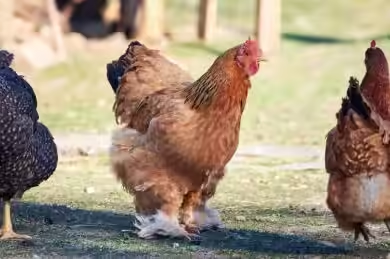Last updated on July 30, 2025
For many backyard chicken keepers, the simple act of collecting fresh eggs is a highlight of the day. That moment of opening the nesting box and finding a clutch of beautiful, colorful eggs is incredibly rewarding. However, it can be disheartening when egg production slows down or stops unexpectedly, leaving you with fewer eggs than you anticipated. If you’ve ever wondered how to encourage your chickens to lay more consistently, you’re not alone, and you’ve come to the right place.
Drawing from years of practical experience and reliable poultry resources, I’ve learned that achieving consistent egg production isn’t about complicated methods. It’s fundamentally about ensuring your flock is healthy, comfortable, and well-cared for. Happy, thriving hens are naturally the most productive layers. This article will share 15 straightforward, actionable secrets focused on key areas like nutrition, environment, and flock health. By implementing these simple practices, you can create optimal conditions for your laying hens, reduce common issues that hinder production, and enjoy a more abundant supply of fresh eggs from your backyard.
Getting those nice eggs isn’t just luck. It happens when you take really good care of your chickens. Think about it: making an egg takes a lot of energy and stuff from a chicken’s body. If she’s worried, sick, or doesn’t have what she needs, her body will stop making eggs to save energy. It’s like her body says, “Let’s just try to stay alive!” So, let’s learn how to help laying hens feel safe and ready to increase their egg production!
 📈 ROI Strategy: Soybean Farming Profit Per Acre – How Much Do You Make Off An Acre Of Soybeans? →
📈 ROI Strategy: Soybean Farming Profit Per Acre – How Much Do You Make Off An Acre Of Soybeans? →
 Stop Losing Money! 15 Mistakes That Make Noiler Farmers Lose Money—And How to Avoid Them →
Stop Losing Money! 15 Mistakes That Make Noiler Farmers Lose Money—And How to Avoid Them →
Secret 1: Give Them the Best Layer Feed – It’s Like Their Super Fuel!
Okay, let’s talk about food. What to feed chickens to make them lay more eggs? This is super important! Chickens that lay eggs need special food. It’s different from the food baby chicks eat. You need high-quality layer feed. Why? Because this food has the right amount of protein (about 16-18%) and vitamins and minerals. These are mixed just right for making eggs.
Why Does Layer Feed Help Increase Egg Production?
Making an egg uses a lot of a chicken’s body resources! A hen needs protein to build the egg white and yolk. She also needs certain vitamins and minerals to stay healthy and build the shell. Layer feed gives them everything they need. If they don’t get this food, they won’t have the right stuff inside to make eggs all the time. In my experience, switching to a good layer feed made a noticeable difference in egg size and shell strength, boosting overall egg production. According to poultry experts, layer feed should have at least 14% protein for good egg laying (Poultry Extension).
What are Simple Feeding Tips for More Eggs?
Always buy good food that says “layer feed” on the bag. Keep the food in a cool, dry bin with a lid. This keeps it fresh and stops bugs. Make sure they can eat this food whenever they want during the day. Don’t just give them scratch grains (like cracked corn). That’s like giving kids candy instead of a healthy meal. It doesn’t have the right stuff for laying eggs. If you do give scratch, only give a little bit in the afternoon after they’ve eaten their main food (OSU Extension Service).
Troubleshooting Tip: If your hens have good feed but aren’t laying, check their water access next! Also, make sure the feed isn’t old or moldy, as they won’t eat bad feed.



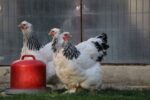
Secret 2: Always Have Fresh Water Ready – They Need to Drink!
Water! This sounds so simple, right? But you might be surprised how often not having water stops chickens from laying. Eggs are mostly water! If your hens don’t have clean water to drink all the time, even for just a little while, they might lay fewer eggs or stop completely. It’s that important for chicken egg production.
Why is Water Key for Consistent Laying?
Water helps everything in a chicken’s body work right. This includes making eggs. If they don’t drink enough, their body saves water. Making an egg takes a lot of water, so the body stops doing it if it’s trying to save water. I’ve seen flocks slow down laying on hot days just because their waterer was empty for a few hours, impacting their ability to get more eggs.
Simple Water Tips for Better Egg Production
Put out more than one water dish, especially if you have lots of chickens. Use water dishes that are easy to clean every day. When it’s freezing cold, use a special heater for the water dish so the water doesn’t turn to ice. When it’s hot, put the water dish in the shade and clean it often so slimy stuff doesn’t grow. A quick tip: check the water every morning and night. Troubleshooting Tip: If they have water but eggshells are thin, they likely need more calcium! Also, make sure the water isn’t too hot or too cold, as extreme temperatures can discourage drinking.
Secret 3: Give Them Extra Calcium for Strong Shells – Say Goodbye to Thin Shells!
Did you ever find an egg with a shell so thin it breaks easily? Or maybe even an egg with a soft shell? This usually means the chicken didn’t get enough calcium. Eggshells are made mostly of calcium, and hens need lots of it to make an egg every day. Their layer feed has calcium, but often not enough when they are laying a lot.


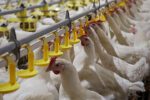

Why Does Calcium Matter for Strong Eggshells?
If a hen doesn’t get enough calcium from her food, her body takes calcium from her bones to make the eggshell. This makes her bones weak over time. It also makes the eggshells weak. Giving them extra calcium lets them take what they need. This helps them make strong shells and keeps their bones healthy. The eggshell is about 90-95% calcium carbonate!(Lohmann Breeders) I always offer oyster shell in a separate dish; it’s like their calcium buffet! This really helps improve egg quality.
Simple Calcium Tips for Better Egg Quality
Put crushed oyster shell in a small dish just for them. Don’t mix it in their regular food. Some hens need more than others. You can also bake and crush your own eggshells. Bake them in the oven at 350°F for about 10-15 minutes first to kill any germs, then crush them up. Make sure this dish of calcium is always full. This is one of the best chicken supplements for layers. Troubleshooting Tip: If shells are strong but they still aren’t laying, check their light exposure! Also, make sure the calcium source is easily accessible and not getting mixed into the regular feed.
Secret 4: Give Them Healthy Treats (But Not Too Many!) – Fun, Not the Main Meal!
Okay, who doesn’t like giving their chickens a little something extra? Giving them healthy scraps or treats is a fun part of raising backyard chickens! Bits of veggies, fruit, or a few mealworms are like candy to them. And you might ask, “What to feed chickens to make them lay more eggs?” hoping treats are the answer. But treats are just for fun, not their main food.
Why Should Chicken Treats Be Limited?
Treats make chickens happy and give them something interesting to do. Some treats, like green leaves or mealworms, have good stuff in them. But they don’t have all the important things a chicken needs to lay eggs. If they eat too many treats, they get full and won’t eat enough of their balanced layer feed. I’ve noticed when I overdo the treats, egg production dips a little.



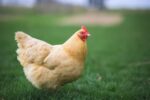

What are Simple Treat Tips for Laying Hens?
Only give them a little bit of treats, like less than 10% of all the food they eat in a day. Give them things like leafy greens (like kale), cooked veggies (like peas), a little bit of fruit, or mealworms. Avoid sugary stuff, salty chips, avocado seeds/skins, or raw potato peels(MU Extension). Give them treats in the afternoon after they’ve eaten their main food. These are some of the best chicken treats for laying when given in moderation. Troubleshooting Tip: If they are eating their layer feed but production is low, consider their age or the time of year (molting). Also, make sure treats aren’t left out to rot, as this can cause illness.
Secret 5: Give Them Enough Light (Especially When It’s Dark Outside) – Let There Be Light!
Did you know that how much light a chicken gets tells her body when to lay eggs? It’s true! Hens need about 14 to 16 hours of light every day to keep making eggs well. When the days get shorter in the fall and winter, the less light tells their bodies it’s time to rest. This is why you get fewer eggs in the winter. This impacts winter egg production a lot.
Why Does Light Help Chickens Lay More Eggs?
Light shines on a chicken’s head and tells a part of her brain to send out special messages (like tiny signals) that make her body get ready to lay eggs. When the days get shorter, this signal isn’t as strong, and her body slows down or stops laying. I use a simple timer on a light bulb in my coop, and it makes a huge difference in winter egg supply! This is what stimulates egg laying during shorter days.
Simple Lighting Tips for Winter Egg Production
If you want eggs all year, put a simple light bulb in the chicken coop. A small bulb (like a 40-watt or a simple LED) is enough. Use a timer. Most people set the timer to turn on early in the morning, before the sun comes up. This makes the day seem longer, like 14-16 hours total. Don’t leave bright lights on all night; they need time to sleep in the dark. Giving them consistent chicken coop light for laying helps a lot.




Troubleshooting Tip: If you’re adding light but they still aren’t laying, check for stress or health issues. Also, make sure the light is bright enough; a dim light might not be enough to trigger laying.
Secret 6: Keep Their Coop Clean and Dry – A Healthy Home!
No one likes living in a messy house, and neither do chickens! Having a clean chicken coop is super important. It stops bad germs and bugs from growing. Chicken poop makes a gas called ammonia. This gas is bad for their lungs. A clean place helps them stay healthy, and healthy chickens lay eggs!
Why Does a Clean Coop Help Chickens Lay Eggs?
Ammonia gas from old poop can hurt a chicken’s breathing tubes and make them sick. Wet, dirty places are where bad germs and bugs like mites and lice love to live. These bugs bother chickens and make them weak. Keeping a clean chicken coop prevents these problems, contributing to overall chicken health. I try to spot clean daily and do a full bedding change regularly; it really cuts down on smells and keeps the birds looking healthy.
Simple Cleaning Tips for a Healthy Coop
Clean out the dirty bedding often. You can scoop out the wet and poopy spots every day. Do a full clean-out every few weeks or months. You can also use the deep litter method, where you add fresh bedding over the old and let it compost naturally, cleaning it out fully less often. Make sure the coop has good airflow so the bedding stays dry and the ammonia gas goes away. Use bedding like pine shavings or straw. Avoid dusty bedding materials (MU Extension ).


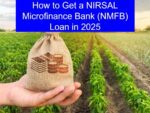


Troubleshooting Tip: If the coop is clean but they seem itchy or uncomfortable, check for external parasites like mites. Also, ensure the coop stays dry, as dampness is a big problem for chicken health.
Secret 7: Make Sure There’s Good Airflow (Ventilation) – Fresh Air is Their Friend!
Talking about ammonia, let’s talk about air moving in the coop. Good ventilation is very important. Ventilation means letting fresh air come in and old, bad air go out of the coop, like opening a window. This helps get rid of wet air, ammonia gas, and bad air. This stops them from having problems breathing, which can make them stop laying eggs fast.
Why is Coop Ventilation Important for Laying Hens?
Good airflow cleans the air inside the coop. This stops them from getting sick with coughs or other breathing problems. These sicknesses often make them stop laying. Good airflow also helps keep the coop dry, which means fewer germs. I learned the hard way that poor ventilation leads to smelly coops and sniffly chickens.
Simple Ventilation Tips for Your Chicken Coop
Your coop should have openings or vents near the top (like under the roof edge). This lets the warm, bad air go up and out. You also need openings lower down for fresh air to come in. The air should move above where the chickens sleep, not blow right on them, especially when it’s cold. Put wire (like hardware cloth) over the openings so animals can’t get in.




Troubleshooting Tip: If the air smells bad even with vents, you need to clean the coop more often or improve bedding management. Also, make sure vents aren’t blocked by nesting boxes or other structures inside the coop.
Secret 8: Give Them a Safe Place to Live – Feeling Safe Means More Eggs!
Imagine always being scared that something is trying to get you. You wouldn’t feel very relaxed, right? Chickens feel the same way! Giving them a safe and secure place is super important. This means having a strong coop that keeps out animals like raccoons, foxes, and hawks. Make sure the doors have strong locks. Use tough wire (called hardware cloth, not chicken wire!) on windows. You might even bury wire around the bottom edge to stop things from digging under.
Why Does a Safe Environment Reduce Chicken Stress?
When chickens are scared often (by animals, loud sounds, or sudden changes), their bodies make stress chemicals. These chemicals tell their bodies to stop using energy to make eggs. The body thinks, “Danger! Let’s just try to survive!” If your chickens feel safe and calm, they won’t have as much chicken stress. Then they can use their energy to lay eggs. I’ve seen a flock stop laying for days after a predator scare.
Simple Safety Tips for Your Chicken Coop
Use hardware cloth (the kind with small squares, 1/2 inch or 1/4 inch) on all windows and openings. Regular chicken wire is too weak. Make sure all doors have strong locks that animals can’t open. Think about getting a door that closes by itself when it gets dark. If you let them walk around outside the coop, watch them or make sure the area is fully fenced and safe. Source: MU Extension
Troubleshooting Tip: If you suspect predator stress, double-check all your coop’s weak points and reinforce them. Also, consider adding motion-sensor lights or other deterrents around the coop area.
Secret 9: Give Them Cozy Nesting Boxes – Their Little Private Spots!
Where do you like to do important things? Probably somewhere comfy and private, right? Chickens are the same way when they lay eggs. They need comfortable nesting boxes! Make sure you have enough – usually, one box for every 3 or 4 hens is good.
Why Do Nesting Boxes Help Chickens Lay Eggs?
Hens like to find a safe, quiet, and cozy spot to lay their eggs. Providing nice nesting boxes makes them want to lay their eggs there. This means you won’t have to hunt for eggs hidden all over the place! It also helps the hen feel calm and safe while she’s laying. I’ve found that keeping the nesting boxes clean and dark makes a big difference in where they choose to lay.
Simple Nesting Box Tips for Laying Hens
Nesting boxes should be a bit off the ground, dark inside, and quiet. Boxes about 12 inches wide, 12 inches tall, and 12 inches deep work well. Put soft, clean stuff inside, like straw, pine shavings, or special nesting pads. Keep the bedding clean. If your hens are laying eggs in other spots, try making the nesting boxes nicer. You can put fake eggs in the boxes to show them where to lay.
Troubleshooting Tip: If they aren’t using the nesting boxes, try making them darker or adding more appealing bedding. Also, make sure the nesting boxes are in a quiet, low-traffic area of the coop.
Secret 10: Help Them Handle Stress – Stay Calm and Lay On!
We talked about being scared of animals, but other things can cause chicken stress too. Too many chickens in a small space, sudden changes (like putting new chickens in without slowly introducing them), loud noises, or even being handled roughly can stress them out. Stress can stop them from laying.
Why is Managing Chicken Stress Important for Egg Production?
Just like being scared of animals, other stressful things make their bodies release stress chemicals. These chemicals tell their bodies to stop focusing on making eggs. If their home is calm and they know what to expect, they will feel better and be more likely to lay. Heat can also cause stress (University of Minnesota Extension). I always try to make changes slowly and keep their routine predictable. For example, adding a new chicken to the flock too quickly without a slow introduction period can be very stressful for everyone!
Simple Stress Management Tips for Your Flock
Try not to make big changes all at once. If you get new chickens, introduce them slowly so everyone gets used to each other. Make sure they have enough room in the coop and the outside area (at least 4 square feet per chicken inside, and 10 square feet outside). Be gentle when you pick them up. Give them things to do, like places to sit up high (roosts), a spot for dust baths, and places to look for bugs. This helps them stay happy and not get bored and stressed.
Troubleshooting Tip: If stress is a big issue, look at overcrowding or recent changes in their environment. Also, ensure they have places to escape if they feel picked on by other chickens.
Secret 11: Know About Their Age and When They Lose Feathers (Molting) – It’s Just a Phase!
Here’s something important to know: chickens don’t lay the same amount of eggs forever. As they get older, they lay fewer eggs. Most hens hit the most chicken egg production in their first year or two. After that, they slowly lay less often. This is just how nature works! Knowing about chicken laying age helps manage expectations.
Molting is when chickens lose their old feathers and grow new ones, usually every year in the fall.
Why Do Age and Molting Affect Chicken Laying?
A young hen’s body is best at making eggs. As she gets older, her body slows down. Molting chickens need a lot of energy and protein to grow new feathers. So, they usually stop laying eggs completely during this time. Their body needs all its energy for growing feathers (Illinois Extension). I always see a big drop in eggs when my flock starts molting, but I know it’s normal and they’ll start back up.
Simple Tips for Managing Age and Molting Chickens
Don’t expect as many eggs from chickens that are older than 3 or 4 years old, even though they might still lay some. Be ready for them to stop laying when they lose their feathers. This usually happens in the fall. You can help them during this time by giving them treats with more protein, like mealworms, or switching to food with more protein for a little while. Knowing about chicken laying age and molting helps you know what to expect.
Troubleshooting Tip: If a young hen is losing feathers heavily outside of the normal fall molt, it could be a sign of stress or parasites. Also, ensure they have a warm, dry place to stay during molt, as they are more sensitive to cold without their full feathers.
(Photo idea: A chicken showing signs of molt, maybe with some patchy feathers)
Secret 12: Watch for Sickness and Bugs (Parasites) – Feeling Sick Stops Eggs!
Just like people, if a chicken doesn’t feel well, she won’t be her best. Sick chickens or chickens with bugs on them will almost always stop laying eggs. Their body is busy trying to fight off the sickness or the bugs! This is why watching for chicken health issues and chicken parasites is so important.
Why Do Health Issues Impact Chicken Laying?
When a chicken is sick or has bugs, her immune system is working hard. This takes away the energy and good stuff from her food that’s needed to make eggs. Illness or bugs also make them feel stressed and uncomfortable, which stops them from laying. I check my flock regularly for any signs that something isn’t right.
Simple Health Monitoring Tips for Laying Hens
Learn what a healthy chicken looks like: active, looking around, bright eyes, clean bottom area, smooth feathers. Check your chickens often for signs of sickness. These include being slow or quiet, feathers looking messy, poop looking different (watery, bloody, or strange colors). Look for bugs like mites and lice by checking their skin and under their feathers, especially near their bottom. For example, tiny red or black dots near the base of feathers or on roosts at night can mean mites. Pasty butt (poop stuck around the vent) is common in chicks but can happen in adults too if they have diarrhea. Ask a chicken expert or vet if you should give them medicine for worms sometimes. If a chicken looks sick, quickly move her away from the others and try to figure out what’s wrong. A healthy chicken is a laying chicken!
Troubleshooting Tip: If you suspect illness or parasites, addressing it quickly is key to getting them back to laying. Also, isolate sick birds immediately to prevent spreading anything to the rest of the flock.
Secret 13: Stop Them From Being Broody (If You Don’t Want Chicks) – Help Them Snap Out Of It!
Did you ever have a hen who just really wanted to sit on eggs, even if there were no baby chicks inside? That’s called being broody!
Broodiness is a strong natural feeling that makes a hen want to sit on eggs to hatch them, and it stops her from laying new eggs.
Why Does Broodiness Stop Chicken Egg Production?
Being broody happens because of changes in her body’s signals (more of a signal called prolactin). This signal tells her body to focus on sitting on a nest and not on making eggs. Think of it like her body pressing a “pause” button on egg laying so she can be a mom. To help her stop, you need to change the things that make her feel like sitting on a nest. This helps her body go back to its normal egg-laying signals. I’ve had to break a few broody hens over the years, and moving them to a wire-bottom cage for a couple of days usually does the trick. This is a common task for backyard poultry keepers.
Simple Tips for Breaking a Broody Hen
The goal is to make the nesting spot not feel cozy. You can try taking her off the nest many times during the day. You can also block off the nesting boxes. Another way is to put her in a special cage for a few days. This cage has a wire bottom so it doesn’t feel warm and cozy like a nest. Make sure she has food and water in the cage. Don’t leave her in there too long, just until she stops acting broody. Helping a broody hen stop is something many backyard poultry keepers do.
Troubleshooting Tip: If a hen stays broody for a long time despite your efforts, ensure she has access to food and water, as they often don’t eat or drink much while broody. Also, check for hidden eggs she might be trying to sit on elsewhere.
Secret 14: Let Them Take Dust Baths and Look for Food (Foraging) – Happy Hens Do These Things!
You know how good it feels to take a shower? Chickens feel the same way about dust baths!
Dust bathing is when chickens dig and roll in dry dirt or sand to clean their feathers and get rid of bugs.
Giving them a spot where they can dig and roll in dry dirt or sand is very important. This helps them clean their feathers and get rid of bugs like mites and lice. It’s something they naturally need to do to stay healthy and happy.
Why Do Dust Baths and Foraging Help Chickens Lay?
Rolling in dust helps chickens clean their feathers. It gets rid of extra oil, dirt, and bugs that can bother them. This keeps their feathers healthy and stops bug problems. Looking for food (chicken foraging) means walking around and scratching for bugs, eating grass, and finding tiny stones (grit) they need to help digest food. This gives them exercise, makes them think, and adds good stuff to their diet. Both dust bathing and foraging make them feel less stressed and help them stay strong and lay eggs. My chickens absolutely love their dust bath area!
Simple Tips for Providing Dust Baths and Foraging
Make a special spot for dust baths. You can use a small plastic pool or a part of their outside area. Fill it with dry soil, sand, or a mix. If you can’t let them walk around freely, make sure their outside area (run) is big enough for them to scratch and look around. Throw some leafy greens or scatter some treats in the run to get them looking for food. Giving them a dust bath for chickens area and letting them forage helps them stay happy. Troubleshooting Tip: If they aren’t using the dust bath, try putting it in a sunny spot or mixing in some sand. Also, ensure the dust bath area stays dry and doesn’t turn into mud.
Secret 15: Think About Natural Helpers (Supplements) – A Little Extra Boost?
Now, let’s talk about some things people ask about: “Does vinegar help chickens lay eggs?” and “Does cayenne pepper help chickens lay eggs?” You might hear people talk about these! Some people say they help, and things like apple cider vinegar might help their tummy health a little. But there’s no real science that proves these things make chickens lay more eggs. Use them carefully and only a tiny bit as possible health helpers, not as magic egg makers.
Why Supplements Might (or Might Not) Be the Best Egg Booster for Layers?
Things like apple cider vinegar might help their digestion a little. Cayenne pepper is sometimes thought to help blood flow. But these things don’t give chickens the main stuff they need to make eggs (like protein, calcium, and vitamins) the way their regular layer feed does. Special chicken helpers you buy might have extra vitamins or good germs (probiotics). These can help chickens when they are stressed, getting better after being sick, or are older. But I’ve found that focusing on the basics (good feed, water, calcium, clean coop) is usually all they need for great laying.
Simple Supplement Tips for Laying Hens
Focus on secrets 1 through 14 first! If you want to try apple cider vinegar, put a tiny bit (like 1 spoon for a gallon of water) in their water a couple of times a week. If you use helpers you buy, follow the directions on the package. Think of these chicken supplements for special times, not as something they need every day. The best egg booster for layers? It’s still giving them the right food and a healthy home!
Troubleshooting Tip: If you’re using supplements but production hasn’t improved, revisit the core needs like feed, water, and light. Also, be wary of products making unrealistic promises; focus on proven methods first.
FAQs – Your Questions About Laying Eggs, Answered!
Alright, let’s answer the questions you might have about getting more eggs! We’ll use what we just learned to give you simple answers.
What is the secret to making chicken lay more eggs?
The secret to making chickens lay more eggs is providing excellent, consistent care focusing on nutrition, environment, health, and managing stress. It’s not one single trick, but doing many things right.
Remember, how many eggs they lay also depends on what type of chicken they are and how old they are (chicken laying age). You can help them lay their best, but you can’t make them lay more eggs than her body can handle.
What to feed chickens to make them lay more eggs?
To make chickens lay more eggs, feed them a high-quality layer feed as their main diet, provide constant fresh water, and offer free-choice calcium like oyster shell. Healthy treats in moderation are okay, but the layer feed is key.
Does vinegar help chickens lay eggs?
No, there is no scientific proof that vinegar directly helps chickens lay more eggs. Apple cider vinegar might support general gut health, which is good for overall wellness, but it doesn’t specifically boost egg production.
What makes chickens start laying eggs?
Chickens start laying eggs primarily because of increasing light duration (around 14-16 hours daily) and reaching sexual maturity (usually 5-7 months old, depending on the breed). Proper nutrition and a good environment also play a role. This is what stimulates egg laying.
How can I get my chickens to lay eggs better?
To get your chickens to lay eggs better, improve their diet (quality feed, water, calcium), optimize their environment (clean, safe, ventilated coop, nesting boxes), monitor their health, manage stress, and ensure they have enough light. Troubleshoot based on the 15 secrets.
Does cayenne pepper help chickens lay eggs?
No, there is no scientific evidence that cayenne pepper helps chickens lay eggs. While sometimes used anecdotally, it is not a proven egg booster and should only be given very sparingly as a treat, if at all.
What is the best egg booster for layers?
The best “egg booster” for layers is providing a balanced diet with high-quality layer feed and calcium, along with excellent care including a clean, safe, low-stress environment and adequate light. Commercial supplements can offer support in specific situations but aren’t magic solutions.
How can I get my chickens to start laying eggs again?
To get chickens to start laying eggs again, identify why they stopped (age, molt, light, stress, sickness, water, feed) and address that specific issue using the relevant secrets. For example, add light in winter or be patient during molting.
Conclusion: Enjoying More Eggs from Your Happy, Healthy Flock!
So, now you know! The real “secret” to getting lots of chicken egg production isn’t one simple trick. It’s about taking excellent, steady care of your chickens and giving them what they need. When you follow these 15 simple secrets for raising happy, healthy backyard chickens, you help them be their best and lay more eggs.
Remember, giving them the right food (chicken feed for layers, chicken calcium), a safe and clean home (clean chicken coop, good ventilation, safe environment), helping them not be stressed (chicken stress), watching their health (chicken health, chicken parasites), and understanding when they get older (chicken laying age) or lose feathers (molting chickens) are the most important things. While breed genetics and individual hen variations exist, providing top-notch care is the foundation for a thriving flock and a more consistent supply of those beautiful, fresh eggs to enjoy! You’ll feel that satisfaction every time you open the nesting box. Happy backyard poultry keeping!

